Anxious Dog Bites Its Owner's Friend After She Brought A Stranger Home Despite Knowing The Dog Was Nervous Around New People
Championing the "adopt, don't shop" advocacy to acquire your pets can be a commendable act. Adopting dogs from shelters or rescues means you are giving this animal a chance to have a great life.
It can, of course, come with its own challenges. Rescued animals often need extra effort and attention to help them come out of their shell.
You have to keep working on earning their trust, and it may take a while, but once you do, it's a rewarding feeling. OP adopted a 3-year-old dog from a shelter.
OP says that her rescue is a beautiful dog, but she is known to be anxious when she's around strangers. OP is mindful of not leaving her alone for too long because her anxiety kicks in.
They have been making a lot of progress with crate training, and OP is delighted. The 30 lbs dog has never once shown any aggression, but she does get nervous easily.
OP was faced with a dilemma when she had to go away for a weekend. She worried about leaving her dog behind and finding someone her dog would be comfortable with.
Luckily, OP's friend Mel, who lives two blocks away from them, volunteered to watch OP's dog. Mel was excited about dog sitting, but OP informed her about her dog's anxiety.
OP introduced them to each other, and it went really well. OP and her dog even spent the night at Mel's house to make the dog a tiny bit familiar with the place.
The first day that OP was away, Mel told her that she left for several hours and left OP's dog in the crate.

The dog was fine, but then Mel went home with a friend, which agitated the dog, so Mel put her in her crate once more.
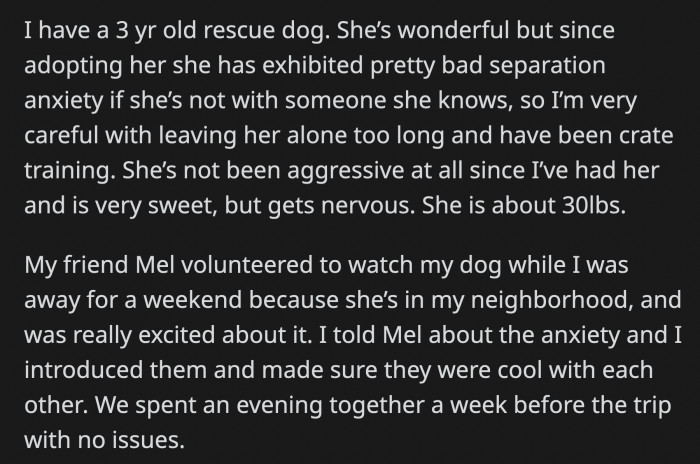
OP gave Mel some tips on how to handle her dog better if she continued barking.
OP called after a while and found out her dog was still in the crate. Mel said that the dog bit her when she picked her up after failing to stop her from barking at her friend.
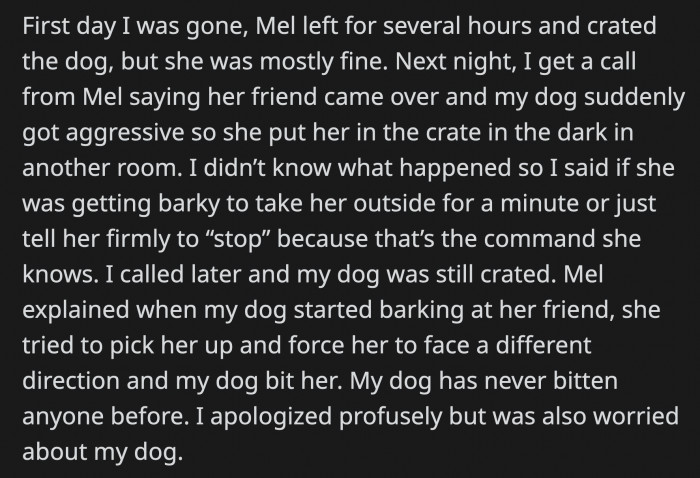
Understanding Canine Behavior
Dogs have unique ways of communicating their discomfort and stress, particularly around unfamiliar people.
Research in canine psychology indicates that dogs often exhibit anxiety through aggressive behavior when they feel threatened.
Understanding these signals is crucial for both dog owners and their friends to prevent potentially dangerous situations.
Understanding Canine Behavior
Dr. Tom Harris, a veterinary behaviorist, explains that dogs have unique social and emotional needs that can be impacted by unfamiliar situations.
When an anxious dog encounters a stranger, it may react defensively as a way to protect itself.
Research shows that understanding canine body language can help owners and caregivers navigate these situations more effectively, reducing the risk of negative interactions.
OP kept apologizing because her dog had never bitten anyone before.
OP asked what happened, and Mel said that this friend she brought home was a different person from the one earlier. Apparently, this was a guy she wanted to sleep with, and Mel kept changing the subject when OP asked if the guy would be sleeping at Mel's house or leaving.
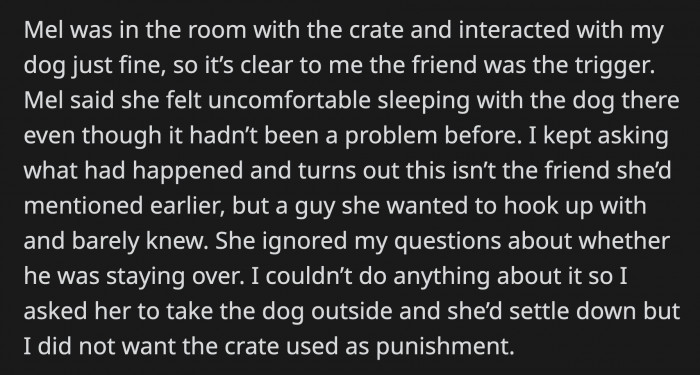
OP apologized when she got home the next day but expressed her frustrations with Mel.
She did bring home a stranger knowing that OP's dog has anxiety triggered by them. Mel told OP that she wasn't mad at her, but she kept blaming OP's dog.
OP said her issue wasn't with Mel's anger but with her allowing a stranger to stay at her place when she volunteered to be responsible for OP's dog. OP said the events of last night probably affected her dog's crate training.
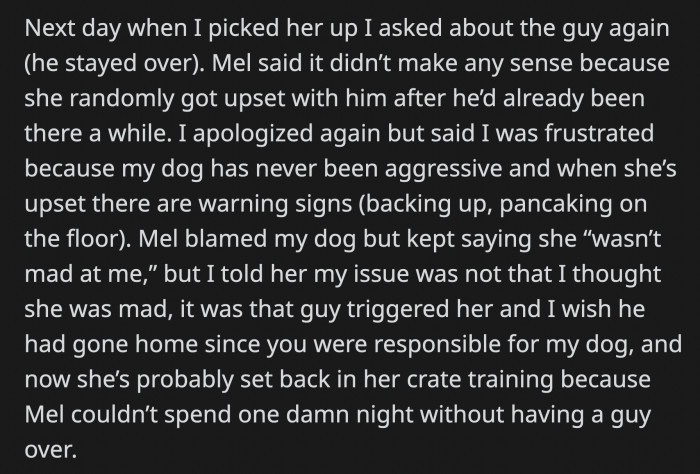
Mel is now mad at OP, but her boyfriend is on her side. OP is conflicted and can't figure out how to handle things with Mel.
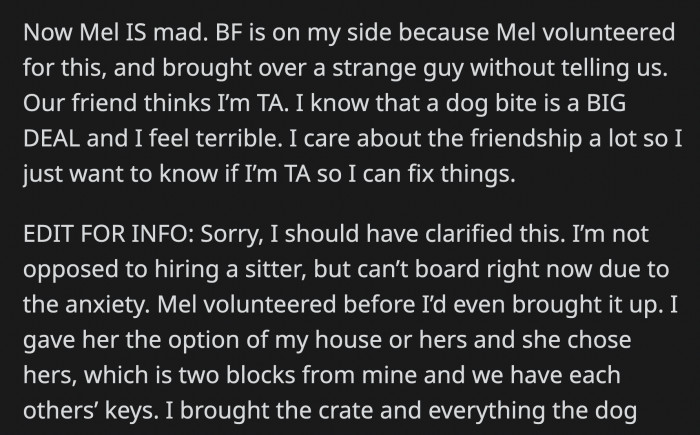
Behavioral studies suggest that dogs' reactions to new people are often rooted in their past experiences, particularly if they were not socialized correctly during their critical development periods.
The owner's friend's choice to bring a stranger into a dog's space illustrates a lack of awareness of the dog's anxiety triggers.
This situation emphasizes the importance of educating friends about the specific needs and comfort levels of pets.
According to studies in the Journal of Veterinary Behavior, dogs that are not properly socialized may develop anxiety and fear-based responses to new people.
These behaviors can result in aggression if the dog feels threatened.
Recognizing these patterns is key to creating a safe environment for both the dog and those around it.
Do you think OP was at fault for leaving her dog with Mel, or is this on Mel for inviting a stranger to stay the night at her place?
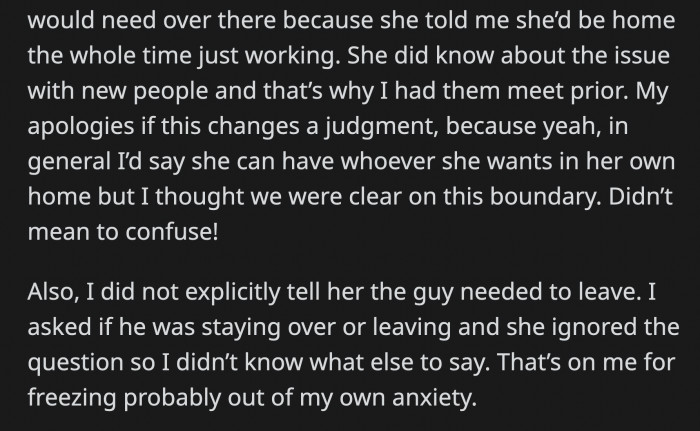
Commenters asked OP for more information before passing down judgment.
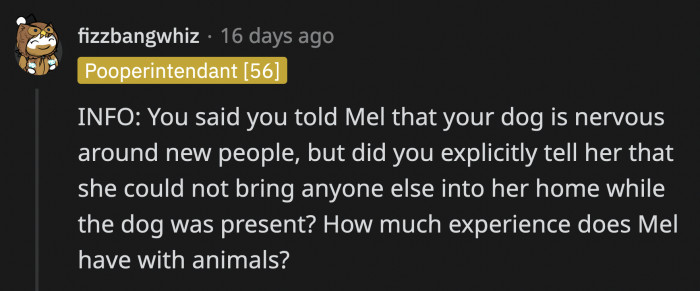
They said that Mel didn't seem like she had a lot of experience with anxious dogs based on OP's story.
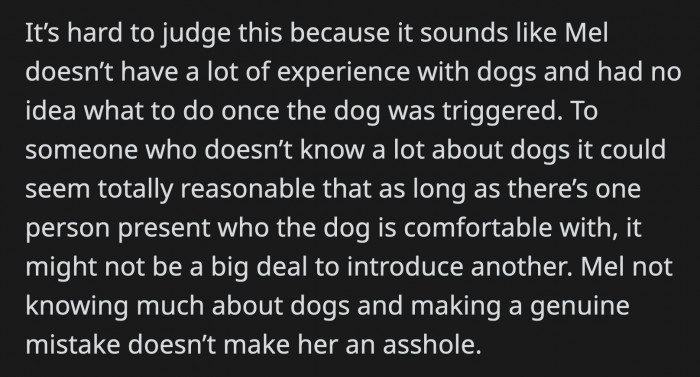
The Role of Socialization in Dog Behavior
Proper socialization is critical for reducing anxiety in dogs when encountering new people.
According to the American Veterinary Society of Animal Behavior, early exposure to various social situations can help dogs develop confidence and reduce fear-based reactions.
This highlights the importance of responsible pet ownership and the need for ongoing socialization throughout a dog's life.
The Role of Socialization in Canine Behavior
Socialization is crucial in helping dogs adapt to new experiences and environments.
Dr. Susan Miller, a canine behaviorist, emphasizes that early and ongoing socialization can mitigate anxiety and improve overall behavior.
Research supports that positive experiences with new people can lead to a more confident and well-adjusted dog.
OP said she assumed Mel would know not to bring a stranger into her house after being informed of the dog's issues, and Mel is a dog owner herself.
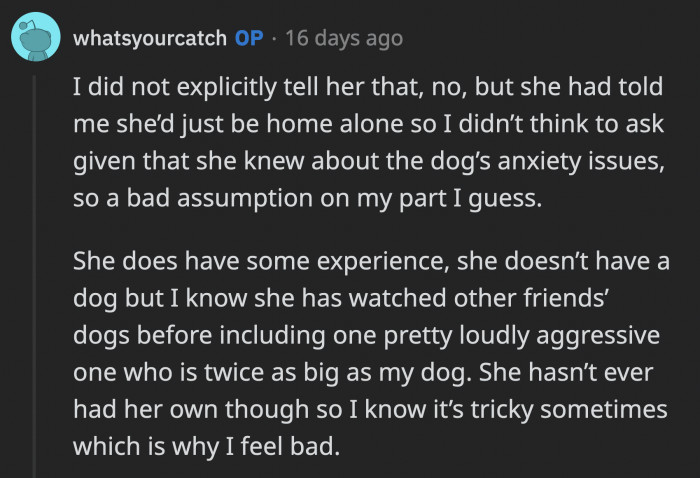
Someone agreed with the comment OP replied to, stating that Mel is not at fault for how things went down since OP didn't explicitly warn her about not bringing another person into her home.
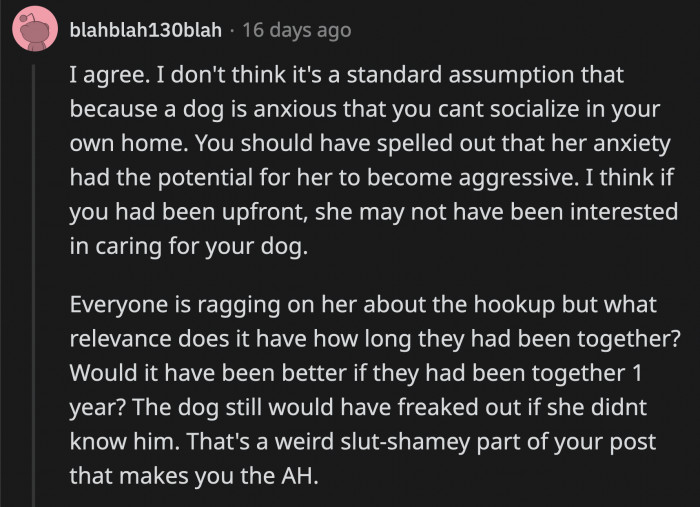
OP said her dog doesn't have a history of aggression, and her body language is obvious when she gets scared.
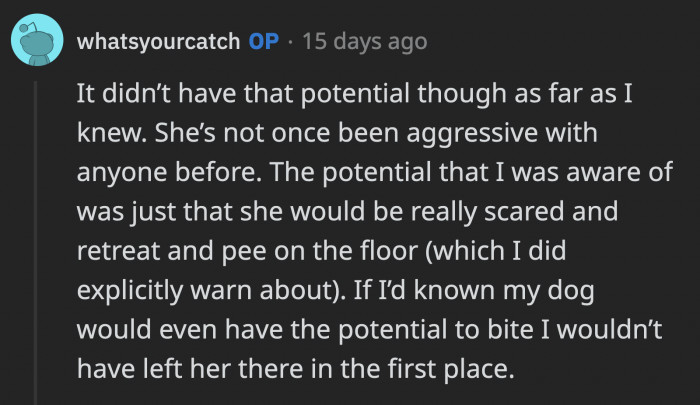
To avoid similar incidents, it's essential to communicate the dog's needs to friends and family.
Studies in communication psychology suggest that providing clear information about a dog's behavior and comfort zones can help others navigate interactions more safely.
Using visual aids or examples can enhance understanding and foster empathy towards the pet's feelings.
Encouraging gradual introductions to new people can help alleviate anxiety for both the dog and the owner.
Using positive reinforcement techniques can create a more positive association with new experiences.
Additionally, consulting with a professional dog trainer can provide valuable strategies for managing anxious behavior.
Most of the comments sided with OP and said she wasn't the a**hole for being upset.
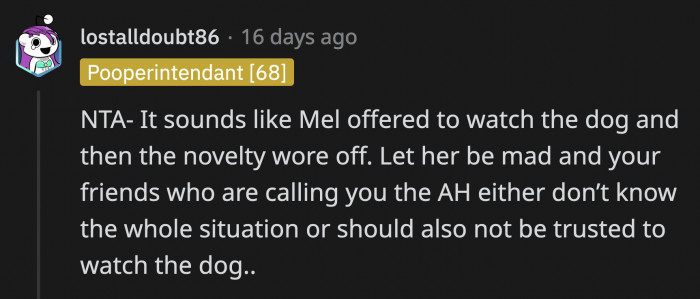
Their suggestion was for OP to stop being friends with Mel after she left OP's dog in a dark room while she was busy with her date.
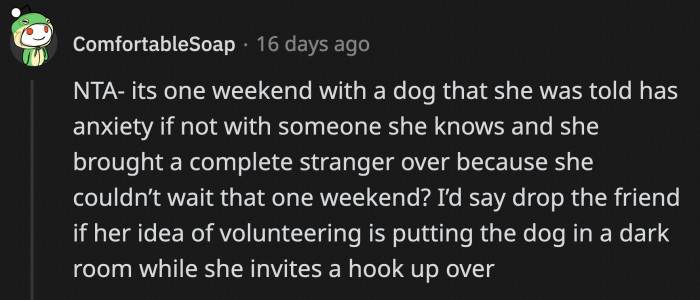
Someone did point out that OP is completely at fault for leaving her dog at an unfamiliar place with someone she wasn't too familiar with.
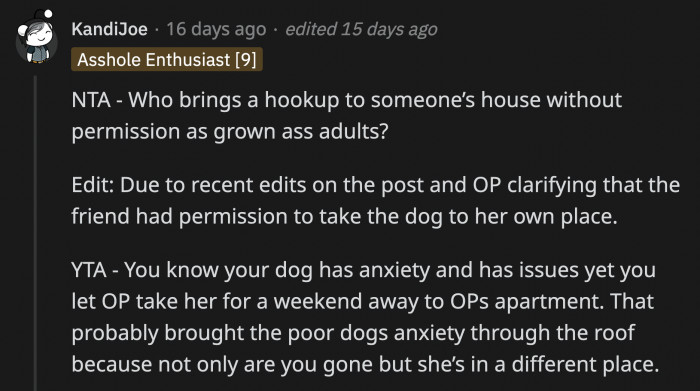
Creating Safe Spaces for Dogs
Establishing safe spaces for dogs can significantly reduce their anxiety when faced with unfamiliar situations.
Research in animal behavior emphasizes the need for a designated area where a dog can retreat when feeling overwhelmed.
Creating these environments not only benefits the dog but also helps owners manage interactions more effectively.
Understanding the Impact of Owner Anxiety
Owner anxiety can significantly influence a dog's behavior, as dogs often mirror their owner's emotional state.
Dr. Rachel Green, a clinical psychologist specializing in animal behavior, notes that anxious owners may inadvertently reinforce their dog's fearful responses.
Research shows that addressing the owner's anxiety can lead to improved outcomes for both the dog and owner.
Ultimately, every person except Mel's date should feel guilty because they all failed to keep the dog safe.

The above comment did trigger a small debate in the comments section.
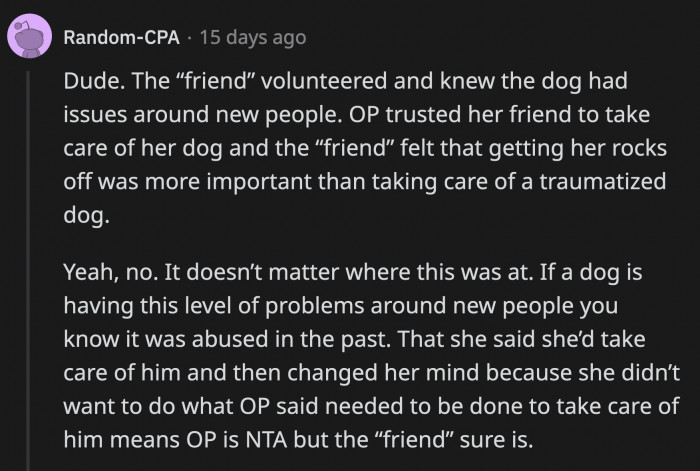
They said that it would have been better for OP to give Mel detailed instructions on what she can and cannot do while taking care of the dog, and OP should have insisted that they stay at her house to keep the dog more comfortable.
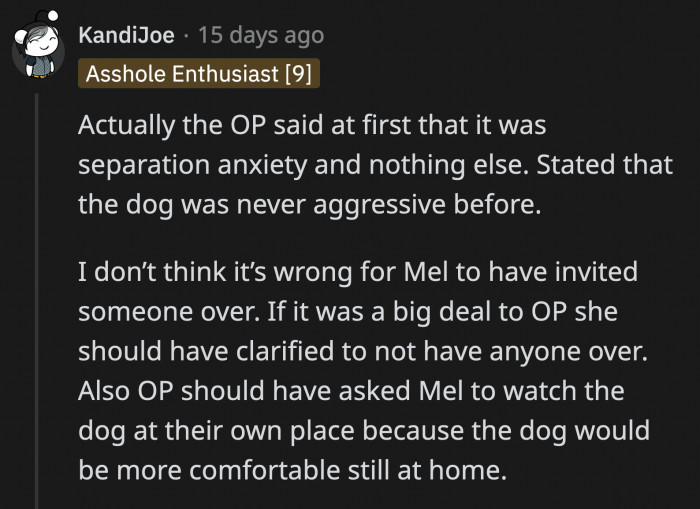
First of all, you shouldn't compare dogs to kids, but that's beside the point. They are correct, though, that Mel volunteered to watch the dog for OP.
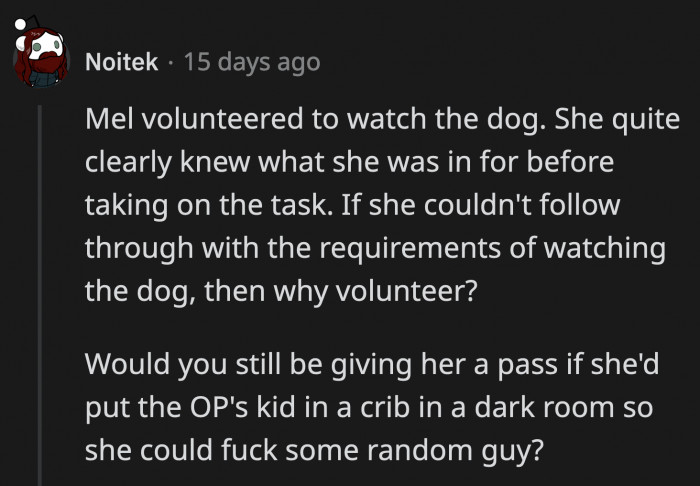
The majority of the people on the sub did say that OP was not to blame, but she can either explain to Mel why she was so upset or keep Mel at arm's length.
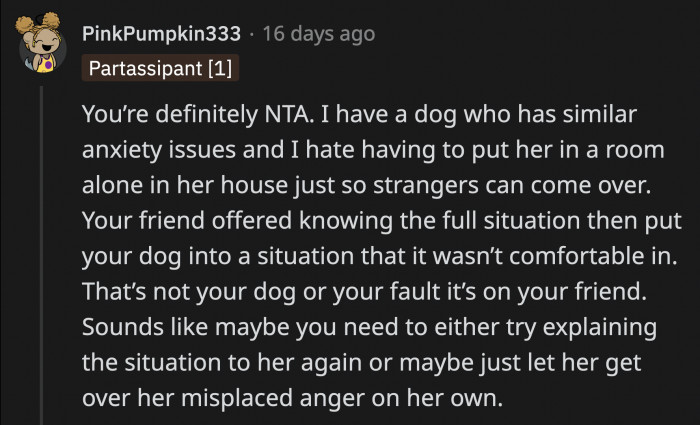
Dogs with anxiety will definitely challenge anyone, even the most experienced dog owners. OP should have pushed for Mel to dog sit at OP's place to keep the dog more relaxed.
Another question did pop up: why couldn't OP's boyfriend watch the dog while OP was away? One thing is for sure: OP shouldn't count on Mel to watch her dog in the future after what happened.
Psychological Analysis
This scenario underscores the significant role that owner behavior plays in shaping a dog's response to new situations.
Understanding these dynamics can lead to more effective training and behavioral management strategies.
Analysis generated by AI
Analysis & Alternative Approaches
Recognizing the complexities of canine behavior and the impact of owner anxiety is crucial for promoting positive interactions.
Research consistently supports the importance of socialization and understanding canine needs in preventing aggressive responses.
Ultimately, fostering a supportive environment for both dogs and their owners can enhance overall well-being.
Analysis & Alternative Approaches
In summary, understanding canine behavior and the impact of socialization is essential for creating safe and positive interactions.
Research highlights the importance of educating friends and family about a dog's needs to prevent anxiety-driven reactions.
By fostering empathy and awareness, individuals can work together to ensure a more harmonious environment for both pets and their humans.



